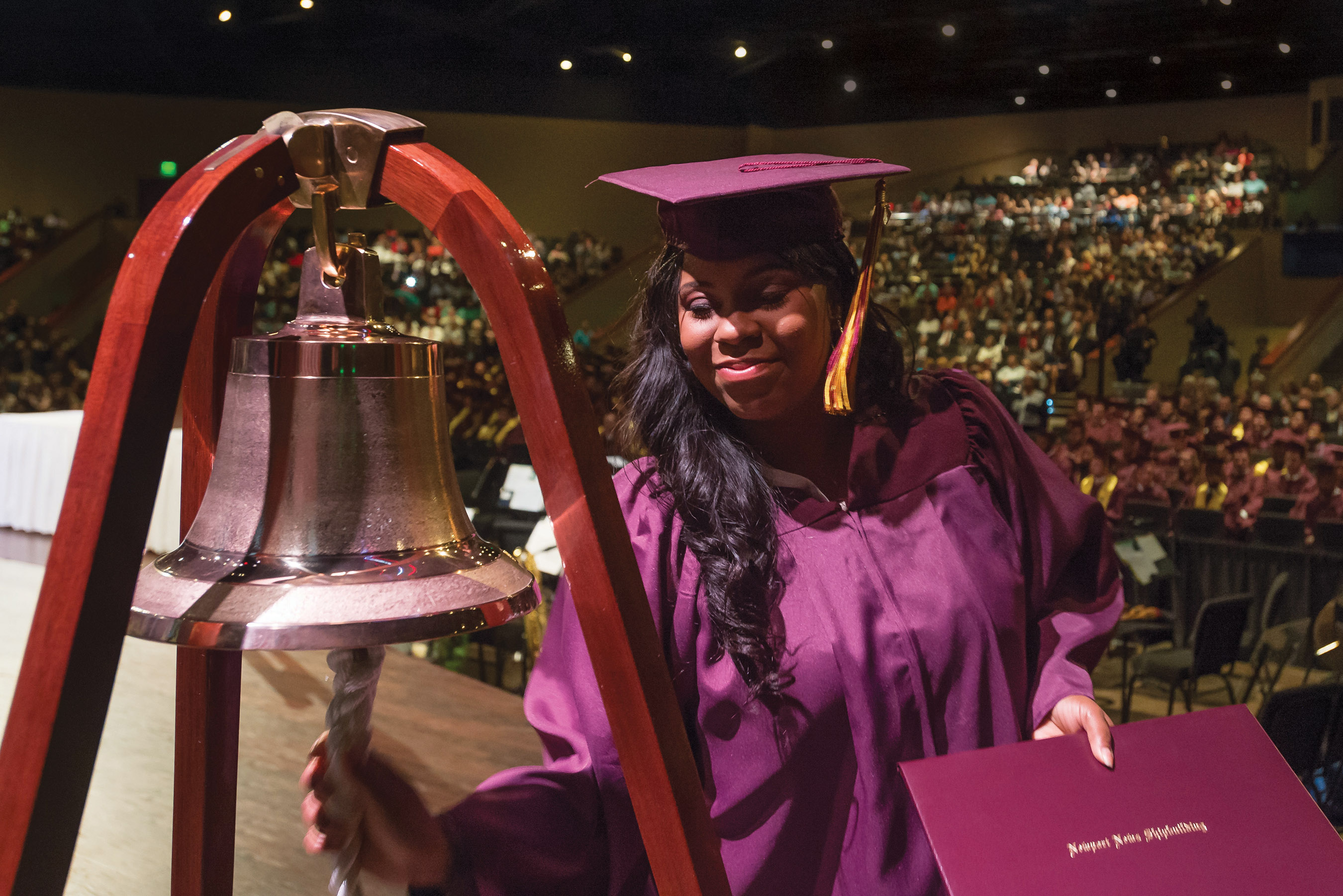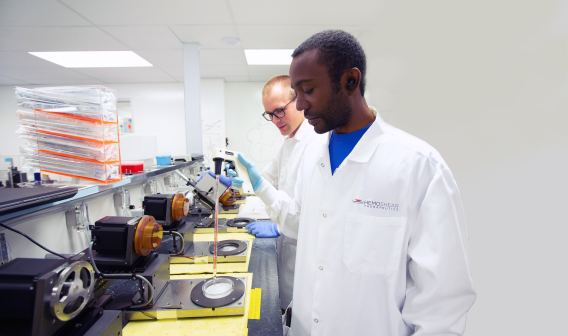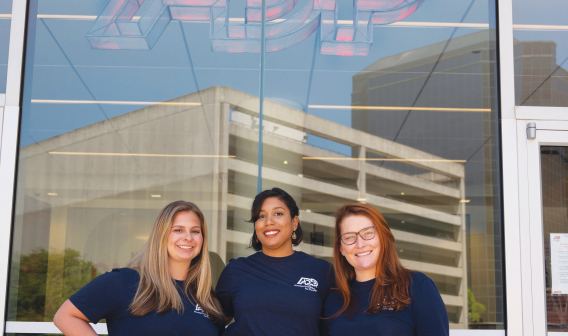HII Leans on Local Partners to Fill Significant Workforce Needs
This spring, students from The Apprentice School in Newport News donned unusual headgear to learn about welding. Rather than slipping on welding masks, they strapped on virtual reality headsets.
Safe from sparks and heat, the students fired up virtual power tools and got a firsthand glimpse of what it’s like to fuse metal for a vessel produced by Newport News Shipbuilding (NNS), a division of HII, formerly known as Huntington Ingalls Industries.
Since 1919, The Apprentice School has trained thousands of students for shipbuilding and repair work at Newport News Shipbuilding, the largest manufacturing employer in Virginia and the sole designer and builder of U.S. Navy aircraft carriers. Combining new technology like virtual reality with traditional skills training is one of the many ways the school is preparing the shipyard workforce of the future.
“We need to think about innovation and what the next shipbuilder needs to look like,” said Dr. Latitia McCane, director of education for The Apprentice School, which offers apprenticeships in 19 trades and eight optional advanced programs, as well as the opportunity to earn a college degree.
Even though we are the largest community college in the area, there’s no way that one community college could really do all the training. We divide up the different training, and among the three colleges, the shipyard has everything it needs.
Since The Apprentice School team is part of Newport News Shipbuilding, they continually stay abreast of in-demand shipbuilding skills, which include software development and data analytics, along with more traditional areas such as pipefitting, painting, and welding.
“We have our hands on the pulse of what the company needs because we are embedded,” McCane said. “We are always in conversations with production leaders to make sure we’re teaching the right things.”
A Pillar of Virginia's Economy
Finding and fostering the next generation of talent is critical to individual shipbuilders’ success — and an essential part of Virginia’s economy. There are more private shipbuilding and repair jobs in Virginia than in any other state, according to the U.S. Maritime Administration. It has just over 30,000 jobs, nearly triple those in second-place Connecticut. That’s a big pipeline to fill, and efforts to get students interested in the industry start well before they can participate in true workforce training through efforts like NNS’s SEEKnns outreach program.
The number of overall direct, indirect, and induced employment associated with the private shipbuilding and repair industry comes in at more than 70,000 jobs.
“We start as early as pre-K in introducing students to the basics of what a STEM field looks like,” said Xavier Beale, vice president of human resources and trades at NNS. “In pre-K, it’s more hands-on skills to really stimulate and inspire. We continue with that because we know we connect with students and future employees early on, but equally as important, the parents.”
A strong shipbuilding and repair industry also benefits other area businesses, such as transportation and food service, said Joe Kosteczko, assistant director of digital shipbuilding at Old Dominion University’s (ODU) Virginia Modeling, Analysis, and Simulation Center (VMASC), a multidisciplinary research center that uses computer modeling, simulation, and visualization to develop new ideas and insights for industry, government, and academia.
The effect of the industry “trickles all the way down to the individual who is working at Starbucks,” Kosteczko said.
Preparing the Next Generation
As existing workers hit retirement age, their ranks need to be replenished with those who can do the traditional trades, as well as workers adept at using burgeoning new technologies.
To create a steady pipeline of new talent, educational institutions like ODU, The Apprentice School, and area community colleges are collaborating with each other — and also partnering with shipyards, industry groups, local workforce councils, and other organizations.
They want to educate potential workers about the wide range of available jobs and provide them with the needed skills for success. Their joint programs range from workshops and one-day events to weekslong intensives and multiyear curriculums.
Among the endeavors is a Marine Trades Training Program that prepares workers for jobs in the shipbuilding and repair industry. The Virginia Ship Repair Association hosts the program, tapping into training from area community colleges — Tidewater Community College (TCC), Paul D. Camp Community College, and Thomas Nelson Community College (soon to be renamed Virginia Peninsula Community College). They’re part of the Community College Workforce Cooperative, an initiative launched in 2021 to create a single point of contact for workforce training at the schools.
We have our hands on the pulse of what the company needs because we are embedded. We are always in conversations with production leaders to make sure we’re teaching the right things.
“Even though we are the largest community college in this area, there’s no way, with the need for shipbuilding and ship repair, that one community college could really do all the training,” said Tamara Williams, vice president, workforce solutions at TCC. “Tidewater does the welding, coating, and pipe fitting, while Thomas Nelson does another portion of the training and Camp does another. We divide up the different training, and among the three colleges, the shipyard has everything it needs.”
TCC is also connecting prospective workers with Lyon Shipyard in Norfolk. The college has a mobile trailer serving as a portable classroom that’s used to teach welding skills off-campus. That unit is currently parked at Lyon, where community members get free training, career readiness skills, and the opportunity to interact with potential mentors on the staff.
Williams deems that endeavor a win-win-win for the college, Lyon, and those looking for work in the trades. “The company just announced that they’re expanding, and they need more workers,” she said. “So, the goal is for applicants to be interviewed and get hired.”
Strengthening the Maritime Industry
At ODU’s Virginia Digital Shipbuilding Program (VDSP), the team conducts research to support the maritime industry and works with a wide range of organizations to develop a robust workforce for today and tomorrow.
VMASC leads the VDSP, an initiative that uses innovative research, curriculum development, and new technology — among other tools — to enhance worker capabilities and workforce capacity and develop solutions to industry challenges. The VDSP collaborates with a wide range of educational, industry, and government organizations, including K-12 school districts, community colleges, The Apprentice School, NNS, the Virginia Ship Repair Association, and the American Society of Naval Engineers.
“All those industry partners are part of the maritime industry, but they all have their own unique needs,” said Jessica Johnson, curriculum coordinator at ODU’s Virginia Digital Shipbuilding Program and director for STEM at VMASC.
Some may want assistance researching workforce development or with other needs, others may seek help in creating a new curriculum, and still others may want access to VMASC’s state-of-the-art digital labs and learning centers to test, train, and work on integrating custom systems into the digital shipbuilding process.
Through those efforts, “We strengthen the maritime ecosystem here,” VMASC’s Kosteczko said.
And while the calls for support may be disparate, many involve a similar theme: showing that shipbuilding and repair can be meaningful, rewarding work.
“A lot of individuals don’t ever get the chance to really understand that working in this industry is truly a very satisfying career,” he said.





